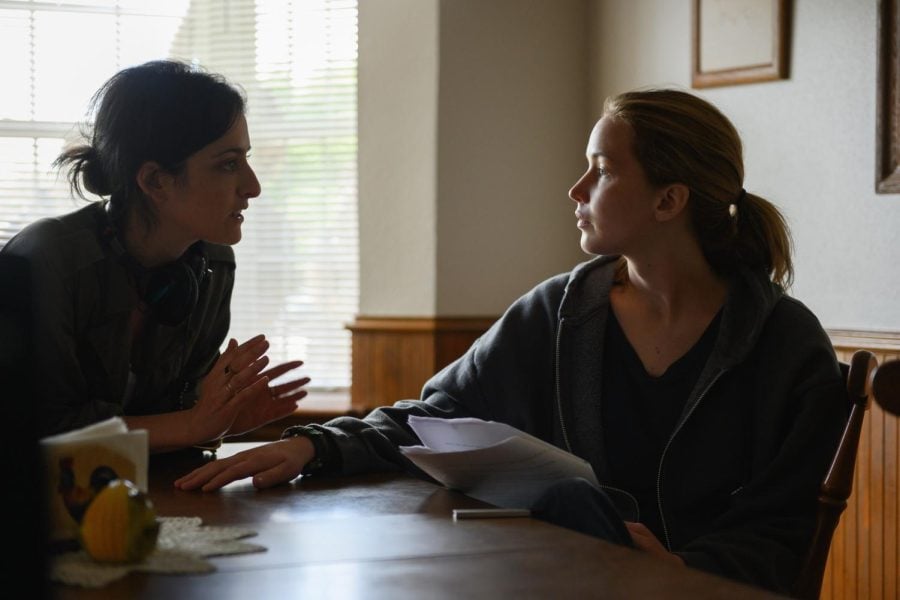Q&A: Lila Neugebauer discusses ‘Causeway,’ working with Jennifer Lawrence and more
Director Lila Neugebauer speaks with Jennifer Lawrence on the set of “Causeway.”
October 18, 2022
Lila Neugebauer’s new film “Causeway” follows U.S. Army Corps Engineer Lynsey (Jennifer Lawrence) and her budding relationship with an amputated mechanic (Brian Tyree Henry) as they explore hurt, healing and human connection. The Daily spoke with Neugebauer about the film, her creative process and working with Lawrence.
This interview has been edited for clarity and brevity.
The Daily: Why did you want to tell this story through the lens of someone like Lynsey?
Neugebauer: I’m not a veteran. I’m not a service member. I’m not in the U.S. Armed Forces. But I was startled when I first encountered this screenplay by how connected I felt to this character’s inner life. I felt recognition, reading the script, and I think that was a critical entry point for me into this material.
The Daily: You’ve known Brian Tyree Henry since your time at Yale. What made him the right person to portray James?
Neugebauer: When I read the script, he was the first person I thought of. Brian is a person and an actor of singular magnetism, depth, humanity, range and sensitivity. And I think in significant part, knowing the depth of Brian’s imagination and soul, his empathetic imagination was a huge part of what made me want to collaborate on this project with him.
The Daily: What was the process of revealing Lynsey and James’s pain and trauma through subtext rather than exposition?
Neugebauer: It became apparent to me that the strongest version of this film was set exclusively in the present tense, in significant part because of what Jennifer and Brian could convey through their performance in terms of the pain they had lived through. It was so potent that it affirmed for me that the focus of this film is not what happened before, which isn’t to say what happened before isn’t important. It’s hugely important, but the focus of the film is how to cope with it, how to live with it.
The Daily: We don’t see Lynsey’s brother for much of the film, yet his absence was almost a presence in itself. Could you speak to how this impacts Lynsey?
Neugebauer: It’s interesting that you say that, because that scene where Lynsey visits her brother in jail was not in the original draft of the screenplay. That character existed but he existed only through his absence. And in the course of developing the script, it began to reveal itself as an encounter that would be useful and revelatory for Lynsey in her journey.
The Daily: What did you want to convey through this story and what do you hope people learn from “Causeway”?
Neugebauer: I had the incredible opportunity to speak at great lengths with the U.S. Department of Veterans Affairs, medical experts in the field of traumatic brain injury. This movie would not exist without those people and the way they opened their lives to me. It’s my great hope that if any service member or veteran sees this film, that they might see any kernel of truth reflected back to them, and that experience of recognition might, in some humble way, be useful.
I would say that recovery is not linear, that the attempt to heal might not look the same in different people and that hopefully, there might be some invitation to empathetic imagination in this film. I’ve also become increasingly aware that many of our returning service members are not able to access the care that they need. If there is any greater awareness produced from seeing this film, about the needs and struggles of integration for our returning service members, I would hope that might be of some use as well.
The Daily: What did you want to portray with the score? How does the soundtrack convey this same sense of intimacy?
Neugebauer: New Orleans is a place of rich and varied musical tradition. Our amazing composer Alex Somers and I talked about that. How could we honor those musical traditions when our protagonist does not feel at home in her home? It felt to both of us that the score, which we knew from the outset we wanted to use very sparingly, should express her soul, her grief, her reaching towards something that she can’t quite name. That was what we were hoping to express and immerse the viewer in to hopefully crack open what is happening underneath the surface.
The score does not reflect (New Orleans). There was a very pleasurable opportunity to collaborate with our sound supervisors and mixers to bring in diegetically the various sonic textures of that place.
The Daily: What were the major nuances and discrepancies of directing for the screen this time around, as opposed to the stage?
Neugebauer: The processes of filmmaking and theater directing are almost opposite. Philosophically, what they’re up to is also quite different. Theater is the spontaneous invention of an ephemeral, temporary community one night at a time with a live audience. Film is capturing lightning in a bottle and freezing it in time.
One of the more joyful revelations of the process is how applicable my whole life in the theater felt to the work of filmmaking. In terms of the development of shared language with an actor, the primacy of visual composition, the basic and core storytelling impulse and the project of creating a community — those impulses all felt deeply connected to me and so fairly intuitive.
Email: [email protected]
Twitter: @andresbuena01
Related Stories:
— Cooper Raiff talks comedy, writing and new film ‘Cha Cha Real Smooth’
— Q&A: Mark Wahlberg talks faith, career and new movie ‘Father Stu’


